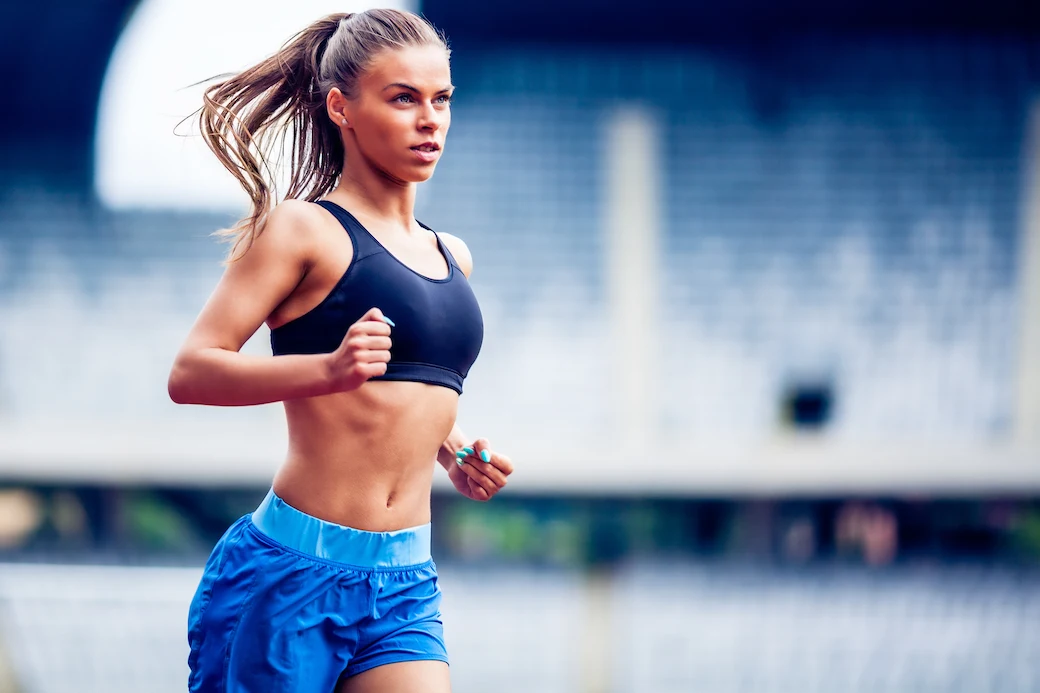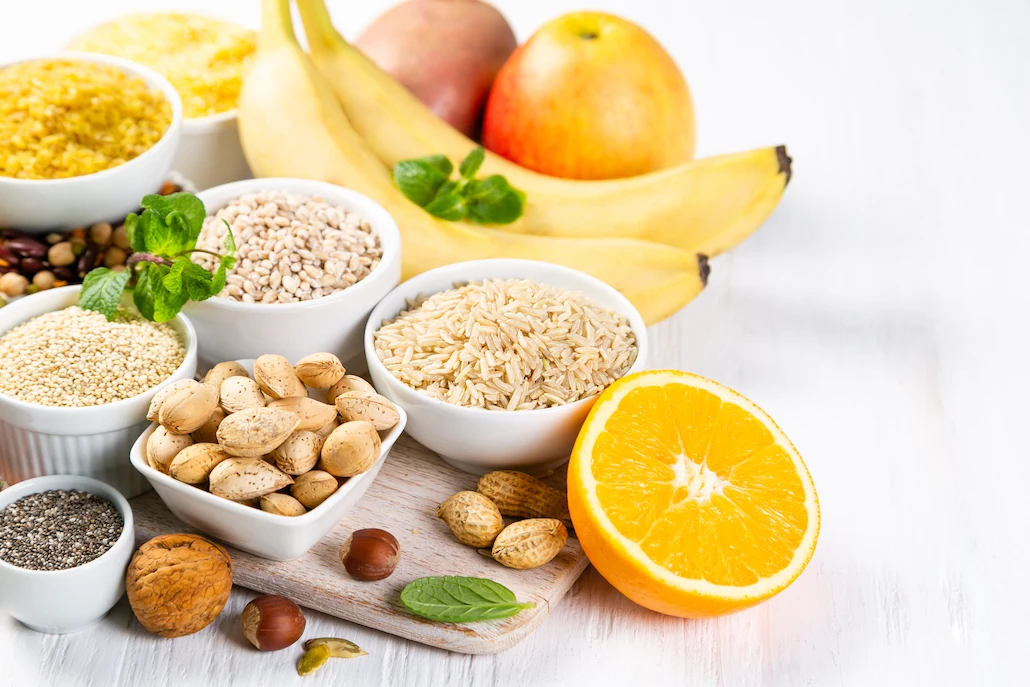Carbohydrates: Are They Good Or Bad For You?

May 8, 2021

Carbohydrates fall in and out of favour as dietary trends change. There is so much confusion around carbs and whether you should or shouldn’t consume them while trying to eat healthier and get fitter. People often think that you have to give up the foods you enjoy in order to be healthy.
The truth is that carbohydrates are good for you, but they aren’t all created equal! You NEED carbohydrates in your diet! I have based my meal plans in the Sweat app around a wholesome and balanced diet, incorporating all food groups.
So, here are the facts.
What are carbohydrates?
Carbohydrates are one of the three macronutrients in our diet, along with protein and fat. Carbohydrates are molecules made up of carbon, hydrogen and oxygen atoms in specific ratios. There are three main categories of carbs in food:
Sugar: these are smaller carbohydrate molecules like glucose, fructose, and sucrose.
Starch: a carbohydrate made from strings of joined glucose molecules. Starch gets broken down to glucose when you digest it to provide energy for your body’s cells.
Fibre: a carbohydrate that can’t be digested, but is still very important for your digestive health.
Are carbs bad for you?
Carbohydrates provide your body with energy, can help to improve focus, recovery, and aid digestion. They are so important for people who are working out regularly because they are the primary source of fuel for your body.
Carbohydrates are also the main fuel source for your brain function, so including them in your diet is crucial. Without carbs, your body needs to work extra hard which may result in minor health issues like headaches, brain fog and generally feeling run-down.
Carbohydrates are found naturally in vegetables, fruit, and grains, along with a wide variety of other important nutrients.

What happens to carbs in your body?
Carbohydrates have an impact on insulin levels (a hormone that helps your body convert carbs into energy). When you eat carbs, they break down into smaller molecules of glucose which enter your bloodstream. This triggers a release of insulin which allows the cells of your body to take in the glucose and use it for immediate energy.
A good example of this is when a marathon runner eats a banana before a race; the carbohydrate in the banana is used up immediately by the body so that the runner gets the quick energy boost they need. But several kilometers into the race, the runner may have used up all of that immediate energy. So what happens then?
This is when our body draws upon stored glucose, also known as glycogen. Glycogen is your back-up fuel. It is excess glucose from carbohydrates that get stored in the liver and muscles to be used when needed, for example, for energy in between meals or during high-intensity exercise. Your liver and muscles only have a limited amount of storage space, so any glucose that can’t fit in those sites will be converted to fat.
To sum it up:
Eating carbs causes blood glucose levels to rise.
Insulin levels rise which leads to higher energy levels.
Excess glucose is stored as glycogen or fat.
Should I eat carbs if I’m trying to lose or maintain weight?
As you can see, only excess carbohydrate contributes to fat storage, so if your goal is to maintain or lose weight, it’s important to understand how much carbohydrate is appropriate for you.
The amount of carbohydrate you should eat depends on your basal metabolic rate, activity level and health and fitness goals. An athlete, for example, may require a higher amount of carbs to fuel their training than an office worker who spends most of their time sitting at a desk.
If you’re worried about carbs causing weight gain, then the most important thing is to make sure you’re burning off any excess energy from carbohydrates by exercising and having an active lifestyle. Remember, excess energy can come from any type of food, not just carbs!
This is great news for anyone who loves pizza or can't resist a good pasta recipe, because it means that you can still eat all of your favourite foods while following a healthier lifestyle.
Are there good carbs and bad carbs?
I don’t believe in labelling foods good or bad, but there are two types of carbohydrates that will impact your body differently: ‘refined’ and ‘unrefined’.
Refined carbohydrates
Also referred to as ‘simple carbohydrates’, refined carbohydrates are carbs that have been highly processed. Refined carbs look very different from how they naturally occur in nature because they have been passed through a manufacturing process that can strip out fibre and other important nutrients. Examples include white bread, soft drinks, cakes.
Try to avoid refined sugar as this type of carbohydrate doesn’t contain any essential nutrients or fibre. It’s very easy to overeat foods containing lots of refined sugar and this can lead to excess carbohydrates being stored as fat.

Unrefined carbohydrates
Complex or unrefined carbohydrates include vegetables, fruit, legumes, and wholegrains.
Unrefined carbohydrates are much healthier for you than refined carbohydrates as they are absorbed much slower. This means that you don’t get a sudden spike in your blood sugar that can lead to a crash in energy levels soon after. The energy you get from unrefined carbohydrates is released slowly throughout the day.
Complex carbs also come with fibre and micronutrients that are important to your overall health.
What carbs SHOULD I be eating?
The best type of carbohydrates to consume are high fibre, complex carbohydrates because these give you long-lasting energy and fill you up for longer. They’re also amazing for keeping your gut in check.
Eating complex or unrefined carbohydrateswith a protein or healthy fat source can help to make your meals more balanced.
Here are some examples of complex carbohydrates:
Wholemeal bread and cereals — I personally love rye bread! (You can even make it into French toast)
Wholegrains such as quinoa, brown rice, whole oats or spelt pasta
Vegetables like sweet potato and beetroot
Whole fresh fruits like apples, berries, and bananas
Legumes like chickpeas and kidney beans
Carbohydrates are essential for good health!
Don't be scared of incorporating carbs into your diet. Understanding the benefits of eating carbs and what types are the best for your body is really important when it comes to staying healthy and achieving your health and fitness goals!
If you’re wondering how you can include good carbs in your meals, my recipes have lots of healthy ideas for you to try.

I’m Kayla Itsines, co-founder and head trainer at Sweat! I’ve been a certified personal trainer since 2008 and am also certified in pregnancy and postnatal exercise. My goal has always been to empower women by giving them the practical tools they need to improve their health and fitness and feel more confident.
* Disclaimer: This blog post is not intended to replace the advice of a medical professional. The above information should not be used to diagnose, treat, or prevent any disease or medical condition. Please consult your doctor before making any changes to your diet, sleep methods, daily activity, or fitness routine. Sweat assumes no responsibility for any personal injury or damage sustained by any recommendations, opinions, or advice given in this article.
Nutrition